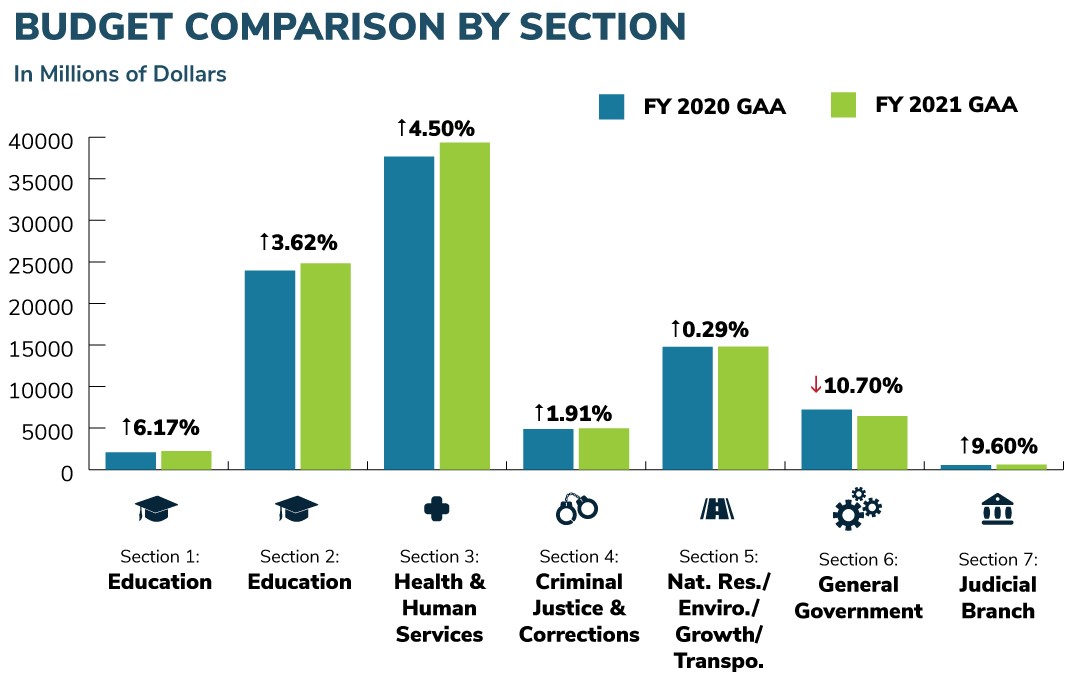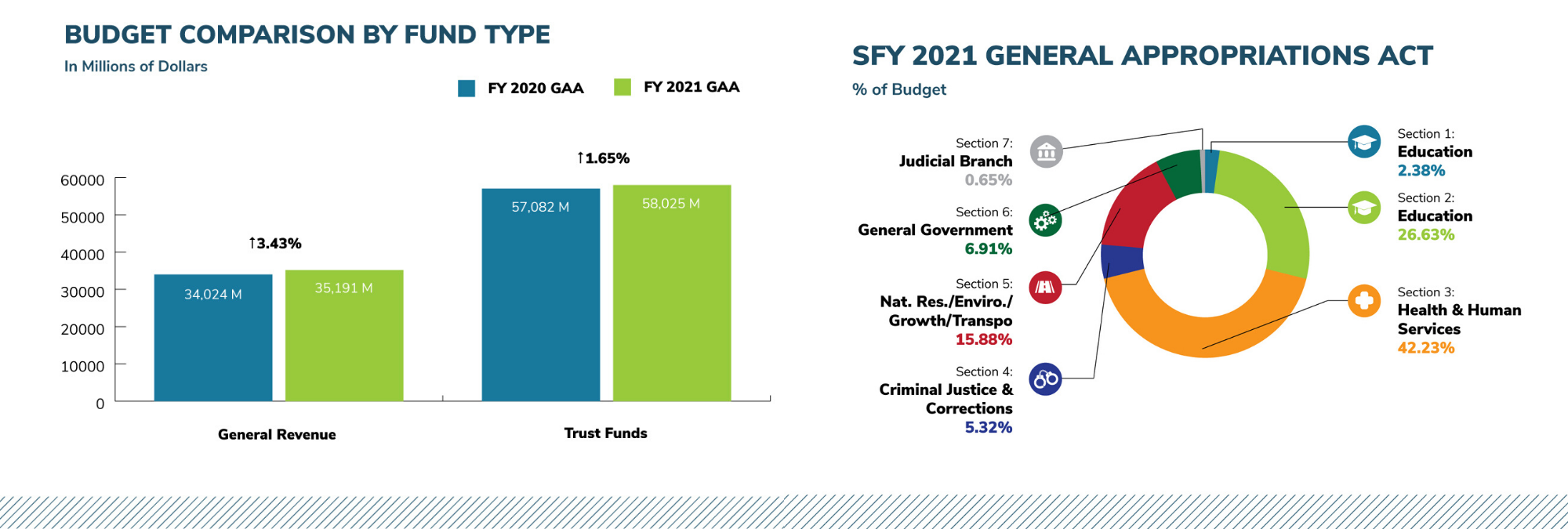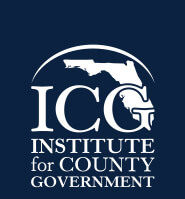Summary
On Sunday, March 15th, the Florida House of Representatives and the Florida Senate agreed to the budget for the State Fiscal Year (SFY) 2020-2021. The budget is the culmination of many rounds of budget negotiations throughout the legislative session. The Florida Legislature is constitutionally required to pass a state budget, officially titled as the General Appropriations Act, during the annual regular session.The House and Senate’s budget for State Fiscal Year 2020-2021 totals approximately $93.2 billion, and represents a 2.3% increase from the previous SFY 2020 General Appropriations Act. The chart below summarizes a comparison of this year’s SFY 2021 budget and the budget approved from SFY 2020.
Health and Human Services received the largest portion of funding for the budget in SFY 2020-2021, totaling approximately $39.4 billion. This represents a 4.5% increase in appropriations from the current year.
All educational programs and services combined received the second largest amount of funding, totaling approximately $27 billion. This represents an increase of approximately 3.83% from the current fiscal year.
Finally, Natural Resources, Environmental Issues, Growth Management and Transportation Expenditures represent the third largest portion of the budget in SFY 2020-2021 with funding equaling $14.8 billion.
This represents a slight increase of approximately 0.29% from the current fiscal year.
All educational programs and services combined received the second largest amount of funding, totaling approximately $27 billion. This represents an increase of approximately 3.83% from the current fiscal year.
Finally, Natural Resources, Environmental Issues, Growth Management and Transportation Expenditures represent the third largest portion of the budget in SFY 2020-2021 with funding equaling $14.8 billion.
This represents a slight increase of approximately 0.29% from the current fiscal year.

General revenue expenditures for the SFY 2020-2021 budget equals approximately $35.2 billion, while trust fund expenditures total approximately $58 billion. The chart below compares expenditures between the SFY 2020-2021 budget and the previous year’s budget for SFY 2019-2020 by fund type.

County Funding Highlights
Health & Human Services:
Shared County/State Juvenile Detention: The SFY 2020-2021 budget estimates the counties’ portion of total Shared County/State Juvenile Detention to be $57,600,640. This represents an estimated increase of about $0.4 million from the current year budget and 48.6% of the total Juvenile Detention funding ($118,517,403).
Community Substance Abuse and Mental Health Services: Funded at approximately $850,798,814 million in the budget, which represents a $16 million increase from the previous fiscal year.
Community Action Treatment (CAT) Teams: The SFY 2020-2021 budget allocates $30.8 million, directed to DCF to contract with providers throughout the state for operation of CAT teams, which provide community-based services for children (aged 11 to 21) with mental health and/or substance abuse diagnoses, which represents a $0.75 million increase from the previous fiscal year.
Public Safety, Mental Health, and Substance Abuse Local Matching Grant Program: The SFY 2020-2021 budget allocates $9 million for the program, which supports county programs that serve adults or youth who are in behavioral crisis and at risk of entering the criminal justice system. This represents the same budget year funding as the previous fiscal year.
Crime Labs: The SFY 2020-2021 budget allocates approximately $61.7 million in grants and aids to local governments for criminal investigations, which represents a 1.42% increase over the previous fiscal year.
Agriculture & Environment
Water Quality Highlights
Water Quality Improvement Grant Program: The SFY 2020-2021 budget allocates $85 million. Specifically, the SFY 2020-2021 budget includes:
$25 million provided for a grant program (up to 50% match) to local government agencies making wastewater and stormwater improvements, including septic conversion and remediation. No match is required for local governmental agencies defined as a rural area of opportunity, or if a local governmental agency is implementing a public private partnership pay for performance agreement. This item is in line with the Blue-Green Algae Task Force consensus findings.
$25 million is directed to projects in the St. Johns River, Suwannee River, and Apalachicola River watersheds.
$10 million is provided for coral reef ecosystem protection and restoration.
$25 million for the Indian River Lagoon water quality improvement projects
Total Maximum Daily Loads: The SFY 2020-2021 budget allocates $25 million to include innovative water treatment projects that demonstrate the ability to most rapidly achieve department verified phosphorous and/or nitrogen load reductions consistent with the nutrient load reduction goals and TMDLs established by the department. The department may also provide cost-share funding for innovative nutrient removal projects.
Harmful Algal Blooms: The SFY 2020-2021 budget allocates $60.6 for innovative technologies and short-term solutions for addressing harmful algal blooms in fresh waterbodies; funds may also be used for the red tide emergency grant program and to support local government efforts in cleaning beach and coastal areas.
Water Quality Enhancement and Accountability: The SFY 2020-2021 budget allocates $10.8 million for increased water quality monitoring, continuation of the water quality public information portal, and to support the Blue-Green Algae Task Force.
Springs restoration: The SFY 2020-2021 budget allocates $50 million from the Land Acquisition Trust Fund for springs restoration projects and land acquisition to protect springs.
Land Acquisition Funding Highlights:
Florida Forever: $100 million, $8.7 million Rural and Family Lands
Florida Communities Trust: $10 million
Florida Recreation Development Assistance Grants: $12.3 million
Beach Management Funding Assistance Program: The SFY 2020-2021 budget allocates $50 million for grants and aids to local governments and non-state entities for beach management assistance.
Resilient Coastline Initiative: The SFY 2020-2021 budget allocates $10 million to assist local governments with sea level rise planning and coastal resilience projects, including storm resiliency as well as coral reef restoration and monitoring.
Mosquito control programs: The SFY 2020-2021 budget allocates $2.7 million.
Transportation & Economic Development
Affordable Housing:
The SFY 2020-2021 budget allocates $225 million for the State Housing Initiatives Partnership (SHIP).
The SFY 2020-2021 budget allocates $115 for the State Apartment Incentive Loan Program (SAIL).
The SFY 2020-2021 budget allocates $30 million for the Hurricane Housing Recovery Program (HHRP).
The Legislature did not sweep funds from the Sadowski Affordable Housing Trust Fund
Job Growth Grant Fund: The SFY 2020-2021 budget allocates $20 million.
Visit Florida: The SFY 2020-2021 budget allocates $50 million.
Small County Outreach Program (SCOP): The SFY 2020-2021 budget allocates $96 million.
Small County Road Assistance Program (SCRAP): The SFY 2020-2021 budget allocates $47.6 million.
General Government
Library Grants and Library Cooperatives: The SFY 2020-2021 budget allocates $22.5 million.
Fiscally Constrained County Funding: The SFY 2020-2021 budget allocates $30.2 million to offset the impacts of previously approved constitutional amendments.
Emergency Distributions: The SFY 2020-2021 budget allocates $25.1 million for emergency distribution revenue sharing for small counties.
Implementing and Conforming Bills
Appropriations Implementing and Conforming bills make certain changes to substantive law in order to implement the proposed General Appropriations Act. Bills of notice include:
1. FRS Contribution Rates (HB 5007): Modifies employer contribution rates.
Employer normal contribution rates for each membership class of FRS (Defined Benefit and Defined Investment) are amended as follows:
Employer normal contribution rates for each membership class of FRS (Defined Benefit and Defined Investment) are amended as follows:
To address unfunded actuarial liabilities (UAL) of the system, the bill amends the current 2020 employer contribution rates for each membership class of FRS as follows:


HB 5003 (Implementing the 2020-2021 General Appropriations Act) creates the “Local Government Efficiency Task Force”. Supported by OPPAGA, the task force will consist of six members with the Governor, the President of the Senate, and the Speaker of the House of Representatives each appointing two members. Members must be appointed no later than September 1, 2020. The task force shall review the governance structure and function of local governments and whether any changes are necessary to make such governments more efficient. The task force shall submit a report to the Governor, the President of the Senate, and the Speaker of the House of Representatives by June 1, 2021. HB 7101 (State Advisory Bodies) failed this legislative session and these provisions were added after the public comment period during budget conference. The provisions were never considered in the Senate and do not provide a requirement that local government officials be represented in the task force.
